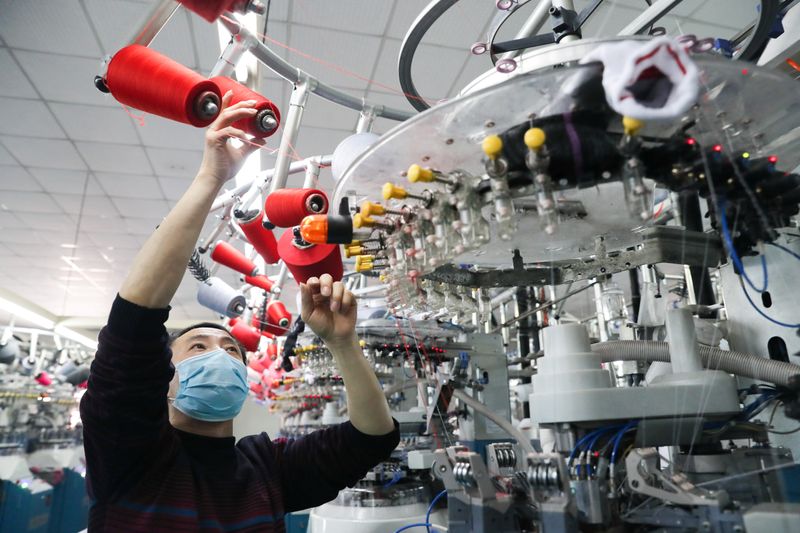By Ryan Woo and Lusha Zhang
BEIJING (Reuters) - Big manufacturing hubs on the Chinese coast are starting to loosen curbs on the movement of people and traffic while local governments prod factories to restart production, following weeks of stoppages due to the coronavirus outbreak.
In their early efforts to contain the virus, authorities extended a week-long Lunar New Year holiday in late January by about 10 days, instituted quarantines, and imposed restrictions on traffic in large parts of the country.
The measures slowed the sprawling industrial sector to a crawl, with companies unable to resume production or restore output to normal levels due to a lack of workers. Many have also been unable to take delivery of raw materials or send products to clients due to logistical hurdles, with the disruptions knocking on along supply chains worldwide.
China is conscious of striking a balance between stamping out an epidemic that has infected more than 70,000 people - killing more than 2,000 of them - and shielding the already weakened economy from more damage.
The city of Foshan, a large manufacturer of electronics and household appliances in the southern province of Guangdong, said late on Tuesday that businesses no longer needed to seek approval before resuming operations and they need not require returning workers to show proof of their health.
On Monday, the nearby city of Zhongshan similarly lowered such administrative barriers.
In the eastern province of Zhejiang, known for its bustling private sector, the cities of Hangzhou and Ningbo over the weekend also pared back the approval process for companies looking to restart.
"Macro and micro data suggest production activities are resuming at a slow pace in China, reaching 60-80% of normal levels by end-Feb and normalizing only by mid-to-late March," Morgan Stanley (NYSE:MS) wrote in a research noted.
"If the spread of the virus is not contained within the next two weeks, the disruption to production could extend into the second quarter."
Analysts polled by Reuters expect China's growth could slow to 4.5% in the first quarter from 6% the previous quarter [ECILT/CN]. But some recently downgraded forecasts are in the 3-4% range, citing delays in resuming production.
TRAINS, PLANES AND CARS
More than 50% of the bigger industrial enterprises in Guangdong, Jiangsu and other large provinces, as well as Shanghai, have resumed production, an official at the National Development and Reform Commission told a briefing in Beijing.
Some cities in Guangdong and Zhejiang this week organized buses and trains to ferry workers back from their hometowns.
The city of Taizhou, in Zhejiang, even arranged for several planes to pick up workers from Chongqing, Guiyang, Chengdu, Kunming and Xian, with the local government of Taizhou footing a third of the bill.
Labor shortages are relatively acute in Zhejiang, Ge Pingan, an official at the Zhejiang government's human resources department, said.
As of Tuesday, 21,800 workers had been ferried back to the eastern province on chartered flights or buses, Ge told a briefing.
Most listed companies in Zhejiang are expected to resume production by the end of February, an official at the Zhejiang securities regulator told the briefing.
The outbreak has also chilled consumer demand and hammered the services sector, with restaurants, hotels, cinemas and travel agents among the hardest hit.
China's auto market, the world's largest, is likely to see sales slide more than 10% in the first half of 2020 because of the epidemic.
In a bid to revive consumption, Foshan announced stimulus measures for its auto market, the first city in China to do so in the virus outbreak.
The city government will offer subsidies of 2,000 yuan ($285) for purchases of new cars and 3,000 yuan for replacement of existing cars, according to a document published on Feb. 3 on its website.
Foshan, where Volkswagen (DE:VOWG_p) has a car plant with FAW Group [SASACJ.UL], will also offer subsidies to help offset the marketing expenses of auto companies.
